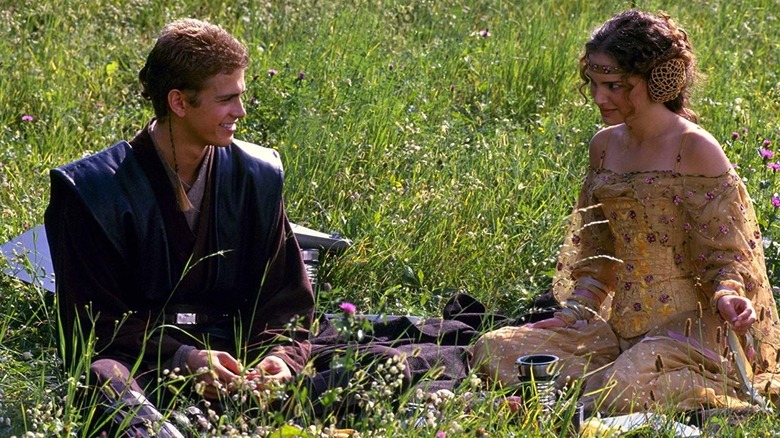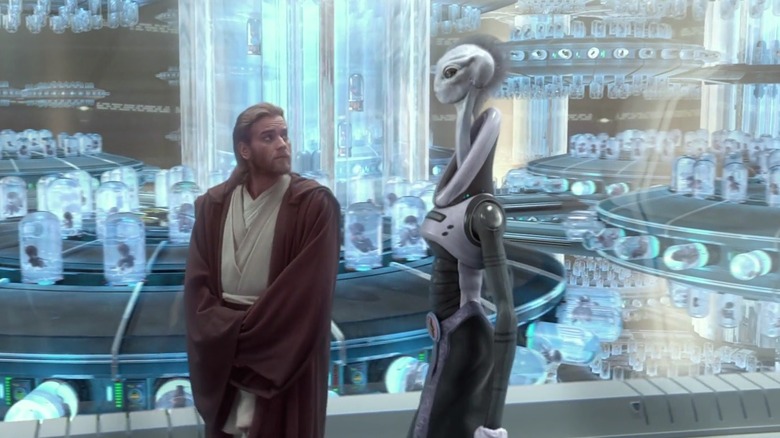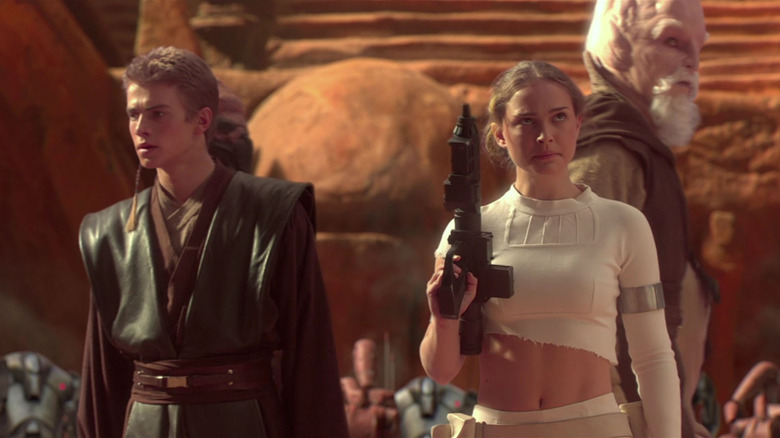Even George Lucas Knows That The Star Wars Prequels Could Get 'Pretty Corny'
George Lucas' 2002 film "Star Wars: Episode II – Attack of the Clones" features a scene wherein the young Anakin Skywalker (Hayden Cristiansen) has an emotional bonding moment with Senator Padmé Amidala (Natalie Portman). The two are slowly falling in love, but they have been prevented from pursuing a romance in earnest by the vague tenets of Anakin's celibate religious order. The clergyman and the politician, both bound by duty, kept apart by circumstances. In a moment of vulnerability, Anakin confesses that he is glad to have escaped his home planet, a desert world. Sand reminds him of his past as a slave, the unhappiest time in his life. Additionally, sand is course and irritating. One can never be clean of it. On a lush, verdant world with Padmé, he is far happier.
Conceptually, the scene is perfectly decent. Yet something about Lucas' choice of dialogue, paired with Christiansen's delivery, made the "I don't like sand" speech one of the more notorious in "Star Wars" history. The speech made rounds as a meme, and was widely mocked by a certain class of online critic/comedian who use the medium of criticism as the basis for comedic bits.
Indeed, all three of Lucas' "Star Wars" prequel films made from 1999 to 2005 became some of the most notorious in pop culture history for many years. With clunky dialogue, odd storytelling choices, many obnoxious characters, an ugly digital visual palate, and a general lack of excitement, the "Star Wars" prequel films were, at least for a time, derided as among the most disappointing events of cinema history.
Lucas, for his part, admitted in the handsome Taschen coffee table book "The Star Wars Archives, 1999 — 2005," that the dialogue was corny. But, he added, by design.
The Star Wars style
It's worth remembering that "Star Wars" wasn't always a bazillion-dollar media franchise that spanned movies, TV, streaming, theme parks, board games, and popsicles. There was a time when it was merely a single film directed by a man who was passionate about Kurosawa movies and "Flash Gordon" serials from the late 1930s. The set-ups in Lucas' 1977 film were, at the time, not meant to connect into a vast cinematic mythology. It merely dipped into traditional cinematic archetypes — the young hero, the old sage, the warrior princess, the handsome rogue, the evil wizard — and presented them with a bigger budget and a better script.
Lucas, in using '30s serials as his template, deliberately left certain awkward, clunky elements in "Star Wars," assuring that its cinematic forebears could still be heard. Large declarative statements and broad character moments are part of the original film's DNA. Lucas, in the Taschen book, felt the need to reclarify that. After so many decades and perhaps too much success, "Star Wars" has outstripped its influences. One must recall that cheesy dialogue was always vital to the series. In Lucas' words:
"It is presented very honestly, it isn't tongue-in-cheek at all, and it's played to the hilt. But it is consistent, not only with the rest of the movie, but with the overall 'Star Wars' style. Most people don't understand the style of 'Star Wars.' They don't get that there's an underlying motif that is very much like a 1930s Western or Saturday matinee serial. It's in the more romantic period of making movies and adventure films. And this film is even more of a melodrama than the others."
As the Star Wars Turns
So "Star Wars," Lucas feels, plays into a type of broad, theatrical, romantic melodrama often seen in Hollywood romances of the 1930s. The "big" lines of dialogue from "Attack of the Clones" include such chestnuts as "I am haunted by the kiss that you should never have given me," and "I wish I could just wish away my feelings." In the Taschen book, Lucas also compares "Star Wars" to another format of long-running, high-drama storytelling: Soap operas.
While many classic TV soaps are now seen as moribund (several of the longer-lived series have been canceled in recent years), their format lives on. Like superhero comics and "Star Wars" and genre-forward entertainments, soap operas present a world without conclusion. Tensions are intended to mount indefinitely, with each new twist meant to outdo the last. in a very salient way, and after so many decades, "Star Wars" has more to do with "General Hospital" than it does with The Hero's Journey.
Lucas reveals that, because of the soap opera dynamics of "Star Wars: Episode III – Revenge of the Sith," he spent more time with his actors than he would have otherwise, and he laid out his rehearsal process. Ordinarily, he and the actors would come to the set prepared, and not a lot of direction would be required once the cameras started rolling. For "Sith," he brought the actors together to block out and rehearse a scene for at least a week out. A huge amount of time for a "Star Wars" movie.
The "Star Wars" prequels were long maligned, but perhaps younger people have still gotten on their wavelength. Any number of prequel apologiae have appeared online in recent years excoriating their hidden virtues. The films are corny, for sure, But have become weirdly beloved.


